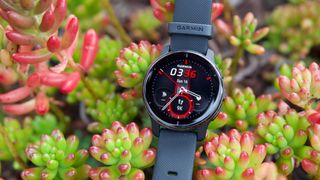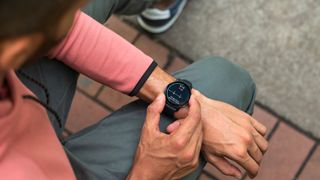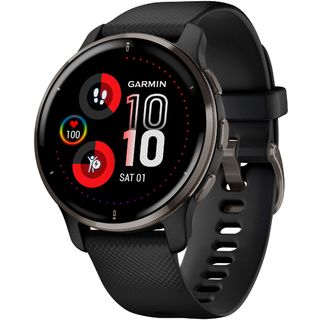First Garmin watch gets long-requested AFib detection, with more to follow
The Garmin Venu 2 Plus receives an ECG app today, with more watches currently seeking regulatory approval.

What you need to know
- Garmin Venu 2 Plus owners in the U.S. will receive a new ECG app in the January 24 update.
- It's the first Garmin watch to record heart rhythm and detect atrial fibrillation.
- Garmin also intends to release the app to more watches and in more regions "in-line with necessary regulatory approval."
Garmin stands above the pack for useful fitness data, but isn't necessarily at the forefront for health tracking. On Tuesday, it took a step to catch up with rival brands by launching an ECG app on the Garmin Venu 2 Plus, with plans to bring on-demand atrial fibrillation (AFib) detection to other Garmin watches in the future.
Venu 2 Plus owners should have access to the app after updating their Garmin watch to the latest version. You'll then have the option to hold the watch's metal bezel for 30 seconds to create an ECG report, which you can set to export automatically to the Garmin Connect app. The app will save your ECG history and let you export a report to share with your doctor if it shows concerning data.
“During the early stages of AFib, it’s common for symptoms to be infrequent, making it difficult to detect in a clinical setting," said Dan Bartel, Garmin vice president of global consumer sales. "With the new ECG App, Venu 2 Plus customers can conveniently take an ECG recording anytime."
Our top pick for the best fitness smartwatch — even before this ECG news — the Venu 2 Plus stands apart from other Garmin watches because of its gorgeous and bright AMOLED display, 9-day battery life, and built-in mic and speaker for Bluetooth calls and a voice assistant.
Garmin will bring AFib detection to other Garmin watches after it receives regulatory approval, but would not hint at which watches would receive it when asked. The Garmin Venu 2 with its similar stainless-steel bezel seems like a safe bet, however.
Other watches with ECG detection like the Fitbit Sense 2 rely on multiple finger contact points along a metal bezel, while the Apple Watch relies on its single Home button. Most likely, premium Garmin watches like the metal-edged Fenix 7 will receive it at some point, but it's less clear for fully-plastic watches with a metal start button like the Garmin Forerunner 955.

It's also important to note that this AFib detection solely relies on active ECG data rather than passive heart rate data. An American Heart Journal study conducted in Taiwan used the Forerunner 945 and separate ECG machines to see how sensitive and accurate the watch's PPG was to patients with known AFib issues — and it was over 90% accurate.
Be an expert in 5 minutes
Get the latest news from Android Central, your trusted companion in the world of Android
Apple, Fitbit, and other watches have received FDA approval for passive AFib detection without requiring an ECG reading. So we can hope that more Garmin watches will receive the functionality over time, especially those with the latest Elevate v4 HRM for the most accurate data. But Garmin had no comment as to whether or not it would ever offer passive AFib.
One last bit of excitement related to this news: earlier in January, the5krunner leaked several alleged Garmin software features, including ECG with AFib detection, an upgrade to PacePro to let you increase or decrease target workout intensity during a run, and new Forerunner models with upgraded AMOLED displays. So we can hope the accurate ECG prediction means more improvements and better running watches are on the way.

One of our favorite fitness devices available, the Venu 2 Plus adds an ECG app to its accurate HRM and SpO2 sensors for a reliable look at your health. It tracks Garmin Body Battery, fitness age, and sleep/stress tracking, while also offering rarer tools like animated exercises and music storage.

Michael is Android Central's resident expert on fitness tech and wearables, with an enthusiast's love of VR tech on the side. After years freelancing for Techradar, Wareable, Windows Central, Digital Trends, and other sites on a variety of tech topics, AC has given him the chance to really dive into the topics he's passionate about. He's also a semi-reformed Apple-to-Android user who loves D&D, Star Wars, and Lord of the Rings.
For wearables, Michael has tested dozens of smartwatches from Garmin, Fitbit, Samsung, Apple, COROS, Polar, Amazfit, and other brands, and will always focus on recommending the best product over the best brand. He's also completed marathons like NYC, SF, Marine Corps, Big Sur, and California International — though he's still trying to break that 4-hour barrier.
